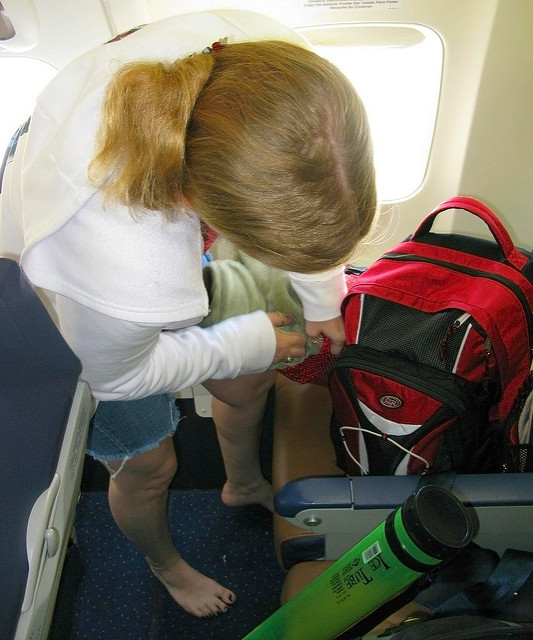If you are planning to travel on a very long haul flight, you should be prepared. How to keep yourself entertained is the least of your problems, trying to get some sleep and avoiding some serious dehydration should be your biggest concerns. 13, 14 or 15 hour flights are a test of endurance, but there are things you can do to survive this test and arrive to your destination feeling fresher than you would expect. Here are some tips.
Packing your carry-on bag:
The first thing to consider is not to pack too much, or you will end up with your legs all cramped up to make room for all your stuff. However, you should pack your essential to-go gear:
- Slip on shoes which are easier to put on and off and preferably a bit bigger than your regular shoe size to fit your feet with that little bit of swelling you get from being on a plane for hours.
- Wool socks to keep your feet warm in a cold airplane.
- An inflatable travel pillow.
- Noise cancelling headphones or earplugs if you are a light sleeper
- Eye mask.
- A personal bathroom kit with toothpaste, toothbrush, hand cream, deodorant, lip balm, face wipes and a moisturizer for your face.
- Light jacket or sweater.
- Comfortable pajama like clothing you can change into once on board.
Before the flight:
You should shower before the flight so you can feel fresh and relaxed and be sure to moisturize your body with some skin lotion; preferably unscented to avoid making yourself or others sick on the flight.
Do not arrive to the airport too early, the last thing you want is to stand in line for hours before you get on a thousand hour flight. Be there at the time stated on your ticket.
Do not eat carbohydrates before your flight; they make you retain water and feel bloated and uncomfortable.
Put on flight compression gear to avoid blood clots and deep vein thrombosis. Sitting for 15 hours straight does not help your circulation, so to keep your body energized and prevent the blood getting stuck in your ankles buy a pair of compression socks which you can easily get in a pharmacy.
Other recommendations to avoid blood clots are to hydrate well the night before the flight; do not drink alcohol the night before nor during the flight; avoid diuretics such as coffee, sodas and even chocolate (anything with caffeine), take a baby aspirin (unless you have any restrictions) to help keep your blood thin and try to get a seat on the aisle so you can get up and walk as much as possible.
Consider getting some sort of sleeping aid. The market has plenty of natural and non harmful methods that can help you sleep during the flight such as melatonin and Ambien, or something like a Tylenol or Benadryl can help you too.
Pack light snacks such as nuts especially almonds (not the salty kind, they might add to dehydration), crackers, cheese, yogurt, protein bars, fruit and maybe dark chocolate.
You need to keep hydrated, so an idea could be to bring an empty water bottle on board so you can ask the flight attendants to fill it up instead of asking for a glass every half an hour.

Image courtesy of colorblindPICASO at Flickr.com
During the flight:
A couple of hours into the flight change into your “comfortable clothes”. It will help you sleep by tricking your brain into believing you are going to bed. And this also means you can change into “fresher” clothes just before landing to make you look nice and rested.
Avoid alcohol; a hangover on a flight is ten times as harder to endure. In regards to the meal on board, avoid the pasta or anything with too many carbs.
Stand up and walk around every time you can and drink tons of water to keep your skin texture, fight off germs and aid blood flow. Remember you need to get your circulation going and dehydration could also lead to muscle cramping.
Use breathing techniques to calm you and keep your body oxygenated. Take a deep breath through your nose while contracting all your muscles from your feet, then exhale and release the contraction; repeat while contracting your lower leg muscles and continue the repetition and moving up through your muscle groups until you reach your face.
Stretch out your neck for 15 seconds tilting your head to the left, then the right, up and finally down.
Avoid ingesting sugar during the flight to help your immune system fight the flus, colds and viruses circulating around the airplane. One sugar snack could suppress your immune system for over 12 hours.
According to dermatologist Carl Thornfeldt there are acupressure points you can stimulate easily to avoid jet lag and help with your general well-being. The spot is on the inside of the ankle, in the depression located halfway between the Achilles and the most prominent point of the ankle bone. Use the back of a ballpoint pen or your finger to rub or press the spot for 20- to 30-second intervals for 10 minutes.

